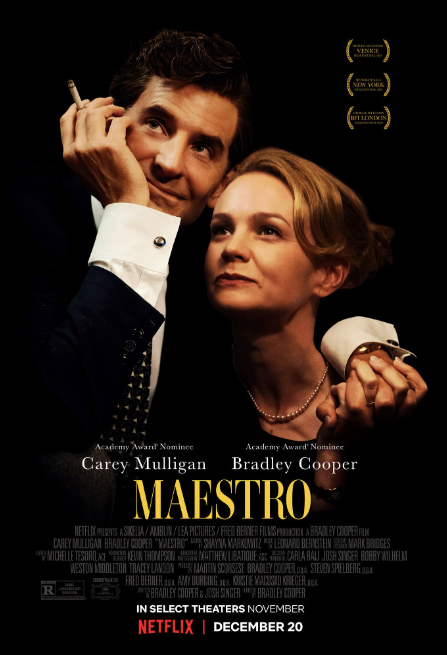
Let me start with what I really liked about Maestro, the biopic about Leonard Bernstein that went up a few days ago on Netflix, after opening in theaters in November.
Bradley Cooper's performance as Bernstein was tour-de-force, an incandescent, stunning rendition of how music inhabited, animated, catapulted the composer and even more so the conductor. I've never seen anything quite like it on the screen. Memorable is really too weak a word to describe it.
But here's what was missing for me: There was no mention of Bernstein's 1967 CBS special Inside Pop: The Rock Revolution. That TV program was a breakthrough in television and in popular cultural history. The Beatles didn't need Bernstein to tell us how great and original they were. Everyone with any ears worth having knew that already. Same for Bob Dylan, The Beach Boys, The Rolling Stones. The Byrds, The Left Banke, Janis Ian, and other recording artists Bernstein featured on the program. We already knew them, too. And if we had any knowledge and appreciation of classical music, we already had come to the conclusion that this kind of rock and folk rock music in some ways exceeded classical music as pathways to our hearts and souls. And would continue to do so into the future. But, Bernstein's CBS special was a welcome and crucially important signal anyway. It broadcast a statement that still feels fresh today: music does not need to be orchestral and written in the past to be eternal.
And yet there was no mention of this at all in the movie. All the more surprising given that David Oppenheim, prominently featured in Maestro as one of Bernstein's male lovers, co-wrote Inside Pop with Bernstein and was its producer.
And that's not all. West Side Story is recognized as one of the greatest musicals of the 20th century. That one musical -- because of its lyrics as well as its music -- probably has had more impact on the world than most of Rodgers and Hammerstein's wonderful musicals put together. You hear some of the instrumental riffs from West Side Story in the background at one point in Maestro, and the famous interview with Bernstein and his wife Felicia on Edward R. Murrow's Person to Person is portrayed in the movie with a brief mention of West Side Story and Stephen Sondheim (Sondheim was not mentioned nor was the name of the musical in the actual 1955 interview). But that's it for Sondheim in Maestro. No short scene of him writing the lyrics or discussing the words put to music in West Side Story with Bernstein. Sondheim is thanked by the producers of Maestro in the credits but has nearly zero presence in the movie. Why was that?
The movie is somewhat controversial in its depiction of Bernstein's bisexuality. He is depicted as genuinely loving his wife, passionately kissing her as he rushes offstage after his tempestuous conducting, and siring their children. But he also flirts with men all the time, seductively massages David Oppenheim's foot, and is seen in bed with a male lover at the beginning of the movie. Other than the fact that he had children, who knows if all of those interactions were an accurate portrayal of Bernstein's sexuality, if he was equally at home with either gender in bed, and if not, which one had greater carnal appeal. So I'll confine myself to saying the whole gamut was very well acted in the movie.
And I'll hope to someday see another biopic of Bernstein that explores and presents a fuller tableau of this genius's extraordinary contribution to the world.
======
an alternate history story about The Beatles
get the paperback or Kindle here

No comments:
Post a Comment